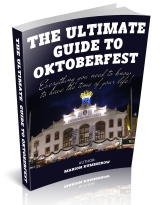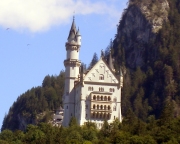How to Get by Train to Munich
Traveling by train to Munich is easy and convenient. Even though the city has three train stations, all long distance coaches arrive and depart at the main station, Hauptbahnhof.
Click here to find the best ways to safe on train tickets to and around Munich.

It is conveniently located in the city centre and hub of public transport as well. All suburban trains (S-Bahn) and four of the underground lines (U-Bahn) cross here; many tramway and bus lines stop just in front of the building.
The railway system itself is quite easy understandable and trains are usually on time (give or take some minutes).
Since Munich is the southernmost major city in Germany, it is the starting or ending point for long distance trains throughout Germany and most major European destinations. Which means, if you fall asleep during the journey, your won't miss your arrival stop :-)
Approximate durations to travel by train to Munich are:

- Frankfurt 3.5 hours
- Berlin 7 hours
- Vienna 4.5 hours
- Prague 6.5 hours
- Milan 7.5 hours
- Rome 11 hours
- Budapest 7 hours
- Zurich 5 hours
- Paris 10 hours
Off course, the duration depends on the kind of coach you take. The ICE (Inter City Express) is the
fastest and most
expensive train with speeds of up to 300 km/h (190 miles/h). It stops only in major cities and travels long distances
throughout Germany.

IC or EC (Inter City or Euro City) link major cities throughout Germany and Europe and are slightly slower than the ICE.
Local railroads include double-decker coaches (my favorites!! sit upstairs if possible) and tilting coaches. Because they connect smaller cities and stop at every corner, they are a lot slower and suitable only for short distance travel of up to 2-3 hours.
 Their main
advantage is that you can get virtually anywhere
and you can use the sensational cheap Bavaria ticket, which is valid for one day everywhere in
Bavaria for up to 5 persons and costs only 27 Euro.
Their main
advantage is that you can get virtually anywhere
and you can use the sensational cheap Bavaria ticket, which is valid for one day everywhere in
Bavaria for up to 5 persons and costs only 27 Euro.
Overnight sleeper or night trains include DB Nachtzug and City Night Line. Depending on the wagon you can choose between three or four categories: Seat, couchette and sleeper.
 Seat can be reclining or not, but they're not the option you'd want to travel a whole night,
except if you're
young and on a REALLY tight budget.
Seat can be reclining or not, but they're not the option you'd want to travel a whole night,
except if you're
young and on a REALLY tight budget.
Couchette are small beds in 6 or 4 person compartments and cost around 30 Euro additionally, whereas
sleepers are comfortable 1 or 2 bed compartments with private bathroom, almost
like a hotel. The price is in line with the convenience ;-)
We usually take the couchette when traveling at night, because it is much cheaper than sleeper and offers sufficient comfort to reach your destination well rested. You can check for one of the special night train promotions Deutsche Bahn offers.
 On Fridays and Sundays all trains tend to be full, peak hour is Friday evening. If possible, schedule your journey
during week or make a reservation (costs 3,50 Euro) well in advance.
I usually reserve only on weekends, during
the week I just hop onto the train without planning ahead.
On Fridays and Sundays all trains tend to be full, peak hour is Friday evening. If possible, schedule your journey
during week or make a reservation (costs 3,50 Euro) well in advance.
I usually reserve only on weekends, during
the week I just hop onto the train without planning ahead.
Anyways, it's a good idea to reserve well in advance, because due to the price system of Deutsche Bahn, the prices will go up considerably, if you book on the spot. Sparpreis discount tickets will save you a lot of money, but you trade in flexibility. You have to take the booked connection and cannot change to another time or day (just like the cheap flight tickets).
Another way to cut down on your travel expenses is to buy a Eurail Pass. Eurail passes exist in a wide variety; they are valid for 14 days up to 3 months of unlimited consecutive travel or 10 or 15 days within 2 months for flexible travel in 18 European countries. If your trip is limited to only 2 or 3 countries you can choose a (cheaper) country pass instead of the full-blown Eurail Pass.
Back to more ways of travelling to Munich
Back to getting around in Munich









